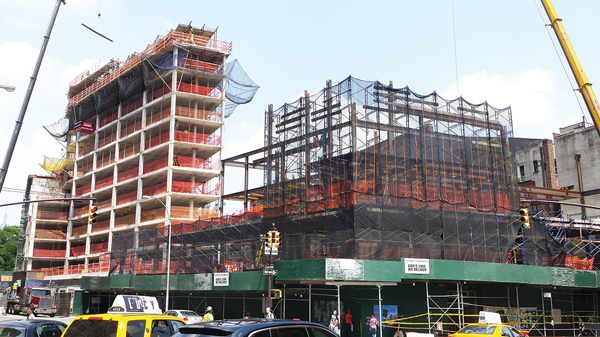
BY MICKI MCGEE | In June the Community Board 2 Land Use Committee met to hear details of the mayor’s rezoning plan that threatens to eviscerate years of neighborhood and community-based zoning in a giveaway to real estate developers under the rhetoric of creating affordable housing. The standing-room only neighborhood crowd — who sharply detailed the flaws in the plan, “Zoning for Quality and Affordability” — recalled a similar meeting two and a half years ago, when scores of South Village residents packed a C.B. 2 Land Use meeting to object to a so-called “minor modification” that would allow God’s Love We Deliver to sell its air rights to luxury condo developer Quinlan-Tavros.
At issue in that November 2012 meeting were the deed restrictions on the two-story G.L.W.D. building at 166 Sixth Ave. The former city-owned building was sold in 1993 to G.L.W.D. at well below market value. With the deep discount came deed restrictions limiting use to very specific community-service purposes. Some of us had lived in the neighborhood long enough to remember when then-Manhattan Borough President Ruth Messinger worked hard to craft a deal that would protect the low-rise character of our neighborhood, but allow the food-service charity to move its headquarters to Spring St.
But in 2012, less evenhanded political forces were at work, and a crafty developer and nonprofit president hatched a plan to seek a zoning modification that would allow them each to build bigger and taller than any of us could have imagined would be allowable.
To achieve this aim they concocted a narrative that strained credulity. As The Villager reported at the time: “In an unusual twist, the open-space requirement of the adjacent planned apartment building will be fulfilled by G.L.W.D.’s garden rooftop. To access the social-service organization’s garden rooftop, the residents would cross G.L.W.D.’s third-floor rooftop, then take an elevator up to the fifth-floor rooftop. G.L.W.D. officials don’t know if the residents will actually want to volunteer in the organization’s garden rooftop — though they hope they will — but this access will be provided to meet the open-space requirement.”
For residents of the South Village, the rooftop garden fable didn’t pass the smell test. How, neighbors asked, could anyone possibly believe this story, or affirm this shameless end-run around the zoning laws and the deed restrictions in place on this property?
Whether our elected and appointed officials believed this fable or not, endorse it they did. From C.B. 2 — which agreed to endorse the plan in a December 2012 full board meeting that was memorable for a maudlin appearance by a former state senator pleading the nonprofit’s case, prompting shocked exclamations of “the fix is in” from neighborhood residents — to the City Planning Commission to the Department of Citywide Administrative Services, everyone fell in line with the powers that be to endorse this trumped-up plan. Everyone, that is, but the residents of the South Village, who set out to see if it might not be possible that zoning laws and building regulations could be enforced.
Nearly three years, three lawyers and many thousands of dollars later, we learned that neither zoning laws, nor construction laws, nor noise regulations would be enforced. Chronicling the many instances of these regulatory failures would take volumes rather than a few hundred words, but consider just these few:
There was that Thursday morning in February 2014 when — after our neighbors had filed more than two dozen complaints of excessive construction noise that were dismissed without investigation by the Department of Buildings and the Department of Environmental Protection — we finally had two D.E.P. inspectors in our building taking sound readings. They only responded after we’d reached out to the Public Advocate’s Office, and provided detailed documentation of countless unresolved complaints dating back months.
We watched as the D.E.P. inspectors used their decibel meters to take the ambient and peak sound levels. With a backhoe-mounted jackhammer cracking away at concrete and masonry just yards from the window, they came up with a decibel reading of 40 decibels peaking at 49. (As a point of reference, 40 decibels is lower than the sound of the average conversation.) Our meter showed 97 dB peaking at 109 dB. But their official meter reading, however skewed, trumped ours. Rigged? You tell me.
Then there were the endless, illegal after-hours variances (so-called A.H.V.’s) granted by D.O.B. at the multiple construction sites in our neighborhood, allowing thunderous construction noise after 6 p.m. and on weekends. City law is very clear about the conditions that allow for A.H.V.’s, limiting them to very specific circumstances. But never mind that. D.O.B. routinely granted illegal A.H.V.’s to G.L.W.D., Quinlan-Tavros and later to Madison Equities at 120-140 Sixth Ave., even when fraudulent applications were filed.
In the case of illegally issued A.H.V.’s, one’s complaint is not with the developer or construction firm, but with the agency that granted it, in this case D.O.B. In such cases one is told by the helpful operators at 311 to file what is known as an “agency complaint.” We filed many. You might be surprised to learn, as I was, that the agency charged with investigating an agency complaint against D.O.B. is none other than the Department of Buildings itself. Yes, the agency is authorized to regulate itself. Here an expression concerning foxes and poultry houses seems relevant.
Just when we thought things could not get darker, something changed. For a brief period starting in spring 2014, we had a break from weekend variances, when two dedicated staffers in the office of newly elected District 3 Councilmember Corey Johnson made it their business to try to get the A.H.V. law enforced. We had a few weekends without construction noise.
But sadly, in mid-February of this year, the councilmember broke it to us that this was simply taking too much of their time: Since he’d been in office, he said, one staffer was spending at least half of his or her time on noise and construction complaints from just our neighborhood. They just couldn’t continue to do that. There were other things they had to work on, other neighborhoods with construction issues, and other priorities.
The councilmember advised me that we should endorse the new A.H.V. legislation that he was co-sponsoring. Unfortunately, endorsing the proposed modifications to the city’s laws regarding A.H.V.’s will do nothing to solve the enforcement issue, since the current version of this legislation still has Buildings regulating itself.
The lack of regulation of D.O.B. — among the most notoriously corrupt agencies in the city, with more than a dozen inspectors and supervisors arrested in February 2015 for even more serious offenses than we experienced in our neighborhood — points to the failure of the city and its agencies to abide by the city’s own laws.
Although the Manhattan district attorney indicted inspectors for the egregious illegality of taking bribes that helped landlords evict rent-regulated tenants, lesser violations of the law that we experienced in our neighborhood seem to be wholly unregulated. That is, when D.O.B. issues illegal variances to politically well-connected charities and developers, no one stands ready to see that the city’s laws are enforced.
Since that discouraging conversation with our councilmember, and in the wake of the arrests at D.O.B., the agency has released a plan to reform itself — yet the new “Building One City” plan leaves intact D.O.B.’s authority to police itself.
This may all seem quite discouraging. I’d be lying to you if I said it wasn’t. But when our neighborhood got into this fight we knew that our chances were slim. The rule of thumb in such legal and political matters is that the party with the most money wins. The smart money was on the developer and the star-studded charity whose fundraising and other special events give our politicians more opportunities to mingle with prospective campaign donors.
So why’d we do it? So very many people asked us that: What’s the use? You’ll never win. Give it up, they said.
We didn’t quit because we believed, and continue to believe, that getting us to give up is how they win. Community apathy and pseudo-democratic participation favor developers and the politicians who support them. Democratic neighborhood activism and genuine civic participation do not.
We like to believe that having just rules and regulations that apply to everyone is a fundamental principle that orders a just society. We note that this principle of fairness is very seldom followed. But where there is selective enforcement of the regulations and laws of society — or unfair norms, regulations and laws — the result is something that folks in the business of sociology, as I am, call anomie. Apathy and detachment are the hallmarks of anomie. And apathy is how they win.
Some people would say that the residents of the South Village lost. Two monstrous buildings have risen to block the sunlight to our parks, playgrounds and gardens. D.O.B. and D.E.P. have failed to do their jobs, allowing after-hours construction and unmitigated construction noise to destroy the quality of life in our neighborhood. And our elected officials have either looked away, or worse yet, joined in the celebration as G.L.W.D. cuts the ribbon on the tin-and-brick junk architecture they have visited upon our neighborhood.
But to those who say we’ve lost, I’d say, think again. Look at every community board or City Planning Commission meeting where you see neighbors speaking out. While there have always been neighbors willing to speak their minds, now there are even more of us. And our numbers are growing. If this is failure, then let’s embrace it. Or, in the words of a mid-century Irish playwright, “Try again. Fail again. Fail better.”
To beat the mayor’s troubling rezoning plan before us, to stop the closing of our local small businesses, to keep our neighborhood storefronts from all becoming chain stores or bars and lounges as commercial rents skyrocket, we’ll need every neighborhood and hundreds of neighbors ready to step up, show up, and speak up. To do that, we’ll have to be ready to try, to fail, and especially, to fail better.
McGee is an associate professor of sociology at Fordham University and a founding member of South Village Neighbors




































